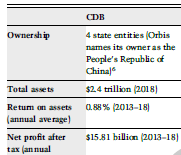
NEW from me @rooseveltinst:
How the Global Minimum Tax Deal Could Bolster Democracy and Make Government Work Better.
Thread...
rooseveltinstitute.org/2021/10/14/how…
How the Global Minimum Tax Deal Could Bolster Democracy and Make Government Work Better.
Thread...
rooseveltinstitute.org/2021/10/14/how…
Last week’s historic announcement of a global minimum tax agreement among 136 nations was rightly celebrated as a victory not only for the economy but for democracy.
https://twitter.com/rooseveltinst/status/1446556672374280201
After 100 years of tax rules that gave multinational capital ample places to hide and evade social responsibilities, the biggest multinational corporations will now be taxed at least partly based on where they actually do business.
That's a sea change that could lead over time to a more just (and democratic) distribution of resources, as @JosephEStiglitz @gabriel_zucman and I wrote @ForeignAffairs (tho read our warnings about the fine print).
https://twitter.com/toddntucker/status/1438870248824848387
But the announcement was also historic and democracy-reinforcing in another, less obvious way.
Some background: Since the Hoover administration, successive administrations have chosen to pass international tax agreements as treaties requiring two-thirds support from the Senate only, rather than as legislation requiring simple majorities in both the House and the Senate.
In an 100 senator chamber, that means that a minority of 34 senators can block treaty action.
But Treasury officials have indicated that they are considering doing away with that arrangement for the international tax deal.
finance.senate.gov/imo/media/doc/…
But Treasury officials have indicated that they are considering doing away with that arrangement for the international tax deal.
finance.senate.gov/imo/media/doc/…

There are good arguments for requiring tax changes to involve the House. As @rebeccakysar has argued, the Constitution requires it, and arguably trumps the document's treaty language, calling into question 90 years of tax treaty practice.
digitalcommons.law.yale.edu/cgi/viewconten…
digitalcommons.law.yale.edu/cgi/viewconten…
But this isn’t only a question of constitutional propriety. It’s a fight over whether a tiny minority of the US Senate will have a veto over the Biden administration’s ability to enact “foreign policy for the middle class.”
foreignpolicy.com/2021/03/17/bid…
foreignpolicy.com/2021/03/17/bid…
The broader context here is that the US Senate is the developed world’s least representative legislative chamber, and is only slated to get worse, with the discrepancy in power between voters in the smallest to the largest states set to double in coming decades... 

Due in part to shifts brought about by climate change, as @thehauer's data shows.
nytimes.com/interactive/20…
nytimes.com/interactive/20…
America’s “upper chamber” is in desperate need of comprehensive reforms, such as those discussed in our 2019 Roosevelt report Fixing the Senate.
rooseveltinstitute.org/publications/f…
rooseveltinstitute.org/publications/f…
But to ensure that future international agreements to help workers & the environment are not hamstrung by 34 senators representing tiny and disproportionately white shares of the population, the bare minimum policymakers can do is pass more agreements by majority vote.
This won't fix everything: the filibuster and even a majority vote in the Senate still skew power to small states. 

But it at least puts international tax votes on par with what we've already be doing for decades for trade agreements
It shouldn’t be easier to pass deals encouraging MNCs to offshore working-class jobs than it is to pass deals making sure those companies pay their fair taxes.
It shouldn’t be easier to pass deals encouraging MNCs to offshore working-class jobs than it is to pass deals making sure those companies pay their fair taxes.
In short, the Biden administration deserves credit for working to ensure that its policy agenda not only reinforces democracy through desirable outcomes but democratizes the process as well.
rooseveltinstitute.org/2021/10/14/how…
rooseveltinstitute.org/2021/10/14/how…
• • •
Missing some Tweet in this thread? You can try to
force a refresh














